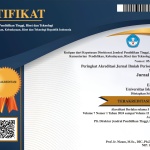Judicial Activism In Criminal Case To Ensure The Human Rights Upholding (Study In State Court Of Semarang)
Abstract
The purpose of this study was to describe, assess, and analyze as to what the underlying factors in implementing the Judge on Judicial Activism practice in criminal cases in order to ensure the upholding of human rights, then any obstacles encountered and solutions that were presented.
This study uses a sociological juridical approach to research is descriptive analytical specifications. The data used are secondary data obtained through library research and primary data obtained through field research then analyzed qualitative use Progressive Legal Theory and Theory of Freedom and Discovery Law of Judge (Rechstvinding).
The results of this study are: 1) Judge's decision to apply for Judicial Activism in criminal cases at least consider several factors, including legal developments always follow people who move quickly, in addition to the Act or other regulations are not always equipped to solve a legal case concretely, and also some other factors; 2) Obstacles that arise in practice Judicial Activism in criminal cases are divided into two (2) factors, namely the internal source of personality and emotionality judges themselves, then external factors relating to the legal system of a country.
Keywords: Judicial Activism; Criminal Case; Judge; Human Rights.Full Text:
PDFDOI: http://dx.doi.org/10.30659/jdh.v2i4.8347
Refbacks
- There are currently no refbacks.
View My Stats

This work is licensed under a Creative Commons Attribution 4.0 International License.
Jurnal Daulat Hukum has been indexed in:

